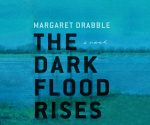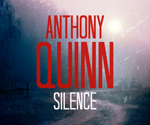Our Lady of the Prairie
Author: Thisbe Nissen
Narrator: Hillary Huber
Published 2018 by Blackstone Audio
15 hours, 7 minutes – Unabridged
 “So much of this life we spend holding ourselves together, when all we’re really looking for is someone who might undo us completely.” This novel documents the undoing (and the possible doing-back-up-again) of Phillipa Maakestad, a 50-year-old theatre professor in Iowa. She has spent the last 20-odd years holding herself together, married to fellow professor Michael and bringing up their mentally ill daughter Ginny. Now, on a semester-long teaching exchange in Ohio, Phillipa meets Lucius Bocelli, a scholar of World War II French collaborationists, and from the moment she meets him, she wants to sleep with him.
“So much of this life we spend holding ourselves together, when all we’re really looking for is someone who might undo us completely.” This novel documents the undoing (and the possible doing-back-up-again) of Phillipa Maakestad, a 50-year-old theatre professor in Iowa. She has spent the last 20-odd years holding herself together, married to fellow professor Michael and bringing up their mentally ill daughter Ginny. Now, on a semester-long teaching exchange in Ohio, Phillipa meets Lucius Bocelli, a scholar of World War II French collaborationists, and from the moment she meets him, she wants to sleep with him.
The desire is mutual, and before long the two are conducting a full-blown affair. When the time comes for Phillipa to return to Iowa, she drives home and immediately confesses to Michael. What ensues in the weeks and months to follow is a messy windstorm of comedy and drama, complicated by Ginny’s marriage to Silas, a young Amish man who has turned his back on his upbringing; Michael’s thoroughly disagreeable mother Bernadette being kicked out of yet another nursing home; Phillipa’s lodging in various short-term situations while conducting a long-distance relationship with Lucius; and the peripheral involvement of various characters residing in River City and Prairie, Iowa.
If you’re looking for epiphanies or the tying up of loose ends, prepare to be disappointed. Instead, Our Lady of the Prairie raises intriguing questions about the nature of our relations with, assumptions about, and obligations to the human beings with whom we surround ourselves in the course of a life. The fact that those questions are not noticeably laid to rest in the course of the novel ought not to detract from the pleasure the listener can take in getting caught up in the whirlwind of Phillipa’s midlife crisis. A longish section in the middle in which Phillipa spins an elaborate fantasy about her mother-in-law’s possible past as a French Nazi collaborator can be received as either a tedious and disorienting interruption of the narrative, or an intriguing flight of historical speculation, depending on your proclivities.
Hillary Huber’s laconic alto is a fitting vehicle for Phillipa Maakestad’s self-absorbed meanderings. In a first-person narrative like this one, the reader’s voice personifies the protagonist, and here that is accomplished seamlessly. Huber capably portrays all of the characters in Phillipa’s orbit as well, with enough vocal variations to differentiate them all.
For listeners who are up for a leisurely paced slice-of-life narrative of one middle-class, middle-aged white woman, who starts out with almost zero self-awareness and ends up with only the slightest awakenings of same, Our Lady of the Prairie may be an entertaining listen. Those who require major revelations and satisfying resolutions may do better to look elsewhere.
~*~
Disclaimer: I received a copy of this audiobook from the publisher as part of the Solid Gold Reviewer program administered by Audiobook Jukebox. No payment was received in return for a review. The receipt of the book had no influence on the opinions expressed in my review.

 When you’re the only female police detective in a world-famous Mexican resort city, with the hustle for tourist dollars on one side, the overwhelming power of the drug cartels on the other, and every interaction steeped in centuries of machismo, it’s complicated. For Detective Emilia Cruz of Acapulco, things are about to get a whole lot more tricky.
When you’re the only female police detective in a world-famous Mexican resort city, with the hustle for tourist dollars on one side, the overwhelming power of the drug cartels on the other, and every interaction steeped in centuries of machismo, it’s complicated. For Detective Emilia Cruz of Acapulco, things are about to get a whole lot more tricky.
 Seventeen-year-old Placidia Fincher, daughter of the Valois plantation in South Carolina, had no immediate plans for marriage on that day in April 1863 that she came home to find a stranger negotiating the purchase of a mule from her father. Still less did she expect that within days she would be mothering a small child and running the estate of an absent Confederate officer, but as the new Mrs. Gryffth Hockaday, that is exactly where she ended up. For the widowed Major Hockaday of Holland Creek, it was perhaps equal parts attraction and expedience that drew him to the bewitching Placidia; with his first wife not long dead, he needed someone to raise his infant son and take charge of his household while he continued to wage war against the Union.
Seventeen-year-old Placidia Fincher, daughter of the Valois plantation in South Carolina, had no immediate plans for marriage on that day in April 1863 that she came home to find a stranger negotiating the purchase of a mule from her father. Still less did she expect that within days she would be mothering a small child and running the estate of an absent Confederate officer, but as the new Mrs. Gryffth Hockaday, that is exactly where she ended up. For the widowed Major Hockaday of Holland Creek, it was perhaps equal parts attraction and expedience that drew him to the bewitching Placidia; with his first wife not long dead, he needed someone to raise his infant son and take charge of his household while he continued to wage war against the Union. This is the story of David Federman: entering Harvard as a freshman, leaving behind the New Jersey boyhood in which he was chronically and unjustly undervalued by his classmates, ready to manifest the greatness that he’s convinced is his by right. That’s his point of view, at any rate. And David’s point of view is the one the listener is privy to throughout this story, which starts out benignly enough but becomes increasingly not for the faint of heart. At first, it appears that this is going to be just another coming-of-age-at-college tale, with a misfit protagonist looking for his tribe in a new venue. David certainly is that misfit, but he is also the loner of the title, and he doesn’t seem all that interested in finding – or even particularly convinced of the existence of – members of his tribe. What he is interested in, from the moment he lays eyes on her, is Veronica Morgan Wells.
This is the story of David Federman: entering Harvard as a freshman, leaving behind the New Jersey boyhood in which he was chronically and unjustly undervalued by his classmates, ready to manifest the greatness that he’s convinced is his by right. That’s his point of view, at any rate. And David’s point of view is the one the listener is privy to throughout this story, which starts out benignly enough but becomes increasingly not for the faint of heart. At first, it appears that this is going to be just another coming-of-age-at-college tale, with a misfit protagonist looking for his tribe in a new venue. David certainly is that misfit, but he is also the loner of the title, and he doesn’t seem all that interested in finding – or even particularly convinced of the existence of – members of his tribe. What he is interested in, from the moment he lays eyes on her, is Veronica Morgan Wells.


